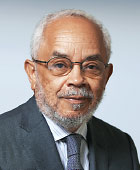I was looking forward to attending the widely advertised C.L.R. James Distinguished Lecture to be delivered on the Barbados campus of the University of the West Indies by Professor Sir Hilary Beckles, vice-chancellor of the university. The occasion celebrated the 60th anniversary of the 1963 publication of Beyond A Boundary (reissued in 2013 by Duke University Press), which has become known as C.L.R. James’ classic text on the history, sociology, and psychology of cricket. I have cited James liberally in my writing on leisure activities and their connection to the notions of belonging and therapeutic landscapes. I also featured him in my teaching about the scholarly contributions of Caribbean figures (such as Austin Clarke, Derek Walcott, George Lamming, and V S. Naipaul) to the literature on social justice. It should be obvious then that the book is about much more than just cricket.
Cyril Lionel Robert James (1901-1989) is known as a Trinidadian historian, journalist, and Marxist who made a place for himself in the contested arena of colonial politics and public cultural criticism. He wrote on diverse subjects and in a variety of literary forms, often using a captivating prose. That night, I wanted to hear more about James and how he came to write a book about a sport while making astute observations about ethics, caste, and race matters in the colonial and postcolonial context of the Caribbean. Professor Beckles, the lecturer, is an established public critic and historian of cricket. He is also a potent voice for the reparations movement inside and outside the post-independence West Indies. Notable, too, is that he leads a university with a prestigious Faculty of Sport.
The lecture turned out to be a simultaneous commentary on sports and life. James’ unique approach in his text was to look at colonial society from the Trinidadian angle, focusing on the intriguing sociopsychological space of cricket. The British had implanted this bat-and-ball game throughout its empire with varying success. As Sir Hilary stated in his presentation, there was little theater in the 20th-century British Caribbean, which therefore allowed cricket to fill that void. The playing field became the stage where the White colonizer lived out his dreams of dominance and superiority. James understood that it was also the place where the Black colonized could attend seriously to the master’s edicts and improve on them. Cricket was ultimately not just leisure and amusement; it became a tool within the broader culture, linked to personal identity and dignity. The West Indies cricket team eventually found its place in international cricket circles with Blacks as team captains.
As I sat in the lecture hall, I recognized that James had framed cricket, the most prestigious sport in the British Caribbean (above even European football), within the complex culture of the British West Indies. James admitted that he was a good cricketer, but not one who had played at the international level. However, he could analyze the finer points of the game while pointing out that competitive sports was in many ways interconnected with the inequities and injustices of a colonized society. He justified his pronouncements in Beyond A Boundary with more than a modicum of arrogance. As he wrote “I did not merely play cricket. I studied it. I analysed strokes, I studied types, I read its history, its beginnings, how and when it changed from period to period, I read about it in Australia and in South Africa, I made clippings, I talked to all cricketers. …”
He was as attentive to cricket as he was to literature and proud that he had pursued both. Noting that he had an “inexhaustible passion” for cricket and English literature, he concluded that his sense of conduct and morals came from these two preoccupations. He knew that the sociopolitical transformation that had to come in the broader colonized Caribbean society would be exemplified on the cricket pitch and reflected in the makeup of cricket teams. Sir Hilary hinted at all this in describing James’ struggle with the publisher over the book’s title: Beyond A Boundary or Beyond The Boundary.
Here is cricket as exemplar of the colonizer’s structural classification in 1930s Trinidad cricket clubs. “The various first-class clubs represented the different social strata in the island within clearly defined bounds,” he wrote. The Queen’s Park Club was “top of the list” and “for the most part white and often wealthy.” The second prestigious club was Shamrock, almost exclusively White and Catholic. Constabulary was made up of members of the local police force, all Black and captained by a White police inspector. There was Stingo, all Black and possessing no social status. James noted that for him, “Queen’s Park and Shamrock were too high and Stingo was too low.” There were two other clubs. One was “Maple, the club of the Brown-skinned middle class. Class did not matter so much to them as colour.” The other club was “Shannon, the club of the black lower-middle class,” with teachers and department store clerks, for example.
After much soul searching and seeking of advice from mentors, James joined Maple. He justified his decision by citing his achievements in the literary arts, while pointing courageously, I suggest, to his wish to keep company with individuals of a lighter complexion. He conceded that it was a costly decision full of social and political implications. Cricket had taught James the fundamental principles of loyalty to people, principles, and institutions. Racialized living was praxis, something more than the contours of theory. ■

